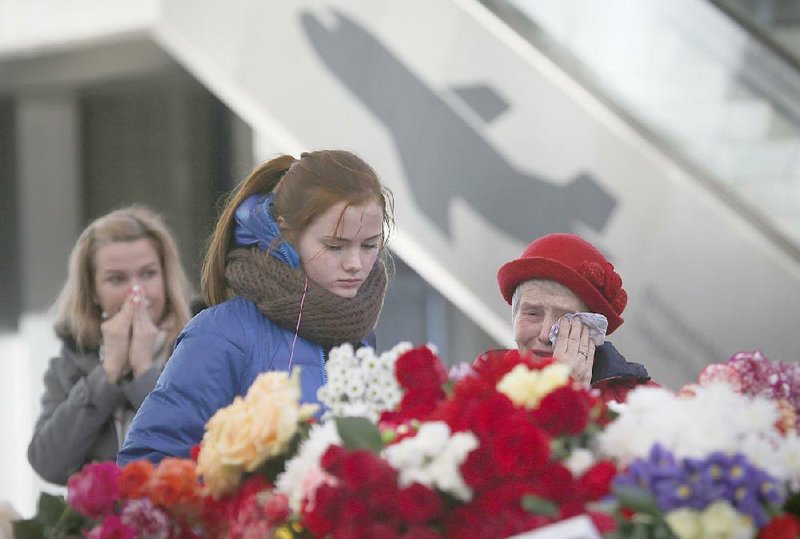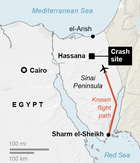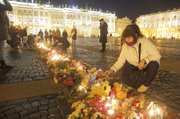CAIRO -- Egyptian President Abdel-Fattah el-Sissi has dismissed as "propaganda" a claim by an affiliate of the Islamic State that it took down a Russian charter plane over the Sinai Peninsula, as investigators in Cairo on Tuesday prepared to analyze data from the aircraft's data recorders.
El-Sissi, speaking to the BBC, said it would "take time to clarify" the causes of the crash that killed all 224 people on board.
Addressing a claim of responsibility that a group linked to the Islamic State issued shortly after the crash, el-Sissi said the comments were intended to damage "the stability and security of Egypt and the image of Egypt," according to excerpts from his remarks posted on the BBC website.
The Metrojet flight crashed Saturday after it left the Egyptian resort of Sharm el Sheikh bound for St. Petersburg, Russia. It fell from cruising altitude, broke up in midair, and left debris across 8 square miles, according to Russian and Egyptian officials.
The cause of the crash has remained a mystery, and the investigation team, with representatives from five countries, has not released any details about what, if anything, their inquiry has uncovered.
Egyptian officials said any theories at this point were premature because the analysis of the data recorders was in its earliest stages.
The Islamic State's Egyptian affiliate, called Sinai Province, said hours after the crash that it was responsible, but it has not made any further statements about the crash or provided evidence to support its claim.
On Monday, Metrojet officials ruled out technical failure or any fault on the part of the airline or its crew, saying that the crash could have been caused by an "external impact," while not explicitly endorsing the view that it was the result of a militant attack.
Two U.S. officials said Tuesday that U.S. satellite imagery detected heat around the jet just before it went down.
A missile striking the Metrojet Airbus A321-200 was ruled out because neither a launch nor an engine burn had been detected, one of the officials said.
The infrared activity that was detected could mean many things, including a bomb blast or that an engine on the plane exploded because of a malfunction.
Aviation analyst Paul Beaver said the heat picked up by the satellite "indicates that there was a catastrophic explosion or disintegration of the airplane," but doesn't reveal the cause.
"It doesn't tell us if it was a bomb ... or if somebody had a fight in the airplane with a gun -- there is a whole raft of things that could happen in this regard," he said.
It also could indicate a fuel tank or engine exploding, although "engines are designed so that if something malfunctions or breaks off, it is contained within the engine," Beaver added.
Both U.S. officials spoke on condition of anonymity because they weren't authorized to discuss the information publicly.
Some aviation experts had earlier said that a bomb was the most likely cause of Saturday's crash, while some others pointed at a 2001 instance in which the jet damaged its tail during landing.
On Tuesday, the Russian news agency Interfax published details about what it said were recordings of the crew's conversations that indicated all was normal four minutes before the plane disappeared from radar screens.
"The crew was engaged in routine communications with air traffic controllers," the news agency said, attributing the details to a source in Cairo. "Sounds uncharacteristic of a standard flight precede the moment of the airliner's disappearance from radar screens," the agency said, quoting the source.
"The recordings suggest that an emergency situation occurred on board unexpectedly, took the crew by surprise and the pilots had no time to send out a distress signal," Interfax said.
The lack of a distress call from the crew would not be unprecedented, according to aviation experts and former crash investigators. In the case of an emergency while in flight, pilots are trained to give priority to flying the plane and addressing the situation before communicating with air traffic controllers.
Russian officials said Tuesday that the bodies of 140 passengers, and other remains, had arrived in St. Petersburg, according to Interfax. Nineteen of the victims have been identified, officials said.
Alexander Agafonov, head of the Russian rescue mission in Egypt, said in a televised conference with other officials that searchers found no more bodies Tuesday after combing an area of 10.8 square miles. Emergency Situations Minister Vladimir Puchkov said the site "should be studied centimeter by centimeter."
"If you need to sift through the sand where the remains or pieces of the fuselage could be, do it," he said.
Information for this article was contributed by Kareem Fahim, Neil MacFarquhar and Nicola Clark of The New York Times; and by Dmitry Lovetsky, Vladimir Isachenkov, Nataliya Vasilyeva, Brian Rohan, Jill Lawless, Lolita C. Baldor, Ken Dilanian and Ivan Sekretarev of The Associated Press.
A Section on 11/04/2015




